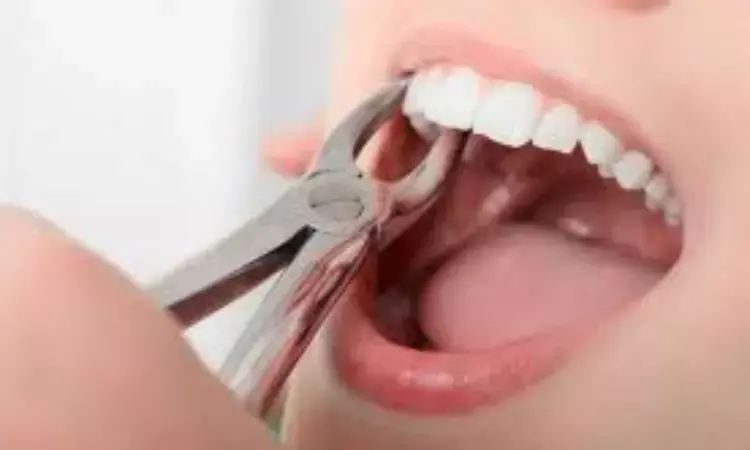- Home
- Medical news & Guidelines
- Anesthesiology
- Cardiology and CTVS
- Critical Care
- Dentistry
- Dermatology
- Diabetes and Endocrinology
- ENT
- Gastroenterology
- Medicine
- Nephrology
- Neurology
- Obstretics-Gynaecology
- Oncology
- Ophthalmology
- Orthopaedics
- Pediatrics-Neonatology
- Psychiatry
- Pulmonology
- Radiology
- Surgery
- Urology
- Laboratory Medicine
- Diet
- Nursing
- Paramedical
- Physiotherapy
- Health news
- Fact Check
- Bone Health Fact Check
- Brain Health Fact Check
- Cancer Related Fact Check
- Child Care Fact Check
- Dental and oral health fact check
- Diabetes and metabolic health fact check
- Diet and Nutrition Fact Check
- Eye and ENT Care Fact Check
- Fitness fact check
- Gut health fact check
- Heart health fact check
- Kidney health fact check
- Medical education fact check
- Men's health fact check
- Respiratory fact check
- Skin and hair care fact check
- Vaccine and Immunization fact check
- Women's health fact check
- AYUSH
- State News
- Andaman and Nicobar Islands
- Andhra Pradesh
- Arunachal Pradesh
- Assam
- Bihar
- Chandigarh
- Chattisgarh
- Dadra and Nagar Haveli
- Daman and Diu
- Delhi
- Goa
- Gujarat
- Haryana
- Himachal Pradesh
- Jammu & Kashmir
- Jharkhand
- Karnataka
- Kerala
- Ladakh
- Lakshadweep
- Madhya Pradesh
- Maharashtra
- Manipur
- Meghalaya
- Mizoram
- Nagaland
- Odisha
- Puducherry
- Punjab
- Rajasthan
- Sikkim
- Tamil Nadu
- Telangana
- Tripura
- Uttar Pradesh
- Uttrakhand
- West Bengal
- Medical Education
- Industry
Woman experiences an acute ischemic stroke five weeks after tooth extraction: Case study

USA: A case report published in the Journal of the American Dental Association has highlighted the rare association between a dental procedure, infective endocarditis, and an acute ischemic stroke.
Zachary M. Wilseck, University of Michigan-Michigan Medicine, Ann Arbor, MI, and colleagues revealed that the risk of developing stroke and infective endocarditis is low among low-risk patients, but it is not nonexistent.
In the case described, the patient was initially deemed to be at low risk and, therefore, not given prophylactic antibiotics before tooth extraction, and, therefore, the development of infective endocarditis led to the detection of valvular abnormalities.
"Proper identification, prompt management, and close interdisciplinary collaborations are important to improve outcomes in these patients," the researchers wrote.
The case concerns a 54-year-old woman who experienced an acute ischemic stroke five weeks following a tooth extraction. The initial symptoms of this patient included right facial drop and mild to moderate word-finding difficulty. Computed tomographic angiography showed a left M1 segment middle cerebral artery occlusion (thrombolysis in cerebral infarction scale, 0) with reconstitution of the distal middle cerebral branches through arterial collaterals.
Following the initial administration of tissue plasminogen activator, endovascular thrombectomy was performed successfully with thrombolysis in cerebral infarction scale 3 (complete) recanalization.
After the procedure, there was an improvement in the patient's language and neurologic deficits. Imaging showed bilateral, multifocal, cortical, and deep brain hemorrhages. Blood cultures grew Streptococcus mitis, ultimately leading to endocarditis diagnosis. Echocardiographic imaging revealed moderate to severe aortic insufficiency, mitral valve vegetation, and mild mitral valve regurgitation.
The cardiothoracic surgery team evaluated the patient after which she was discharged with intravenous antibiotics and short-term outpatient follow-up with the cardiothoracic surgery team.
The case highlights an association between a dental procedure, infective endocarditis, and acute ischemic strokes resulting from large-vessel occlusion or embolus.
In conclusion, dental procedures are generally safe, however, can introduce oral bacteria into the bloodstream, resulting in bacterial seeding of cardiac valves and subsequent infective endocarditis.
The researchers suggest the importance of recognizing infective endocarditis after a dental procedure, including tooth extraction, as a potential cause of an acute ischemic stroke so that prompt treatment can be initiated.
"Dental procedures can be a potential source of bacteremia, leading to the development of infective endocarditis and subsequent complications such as hemorrhagic or ischemic stroke," the researchers wrote.
"Vigilance is important in recognizing the signs and symptoms of infective endocarditis, specifically in patients who have undergone dental interventions and have underlying cardiac conditions or are immunocompromised, they concluded.
Reference:
Bah, M. G., Wilseck, Z. M., Lin, L. Y., Peterson, A. J., Chaudhary, N., & Gemmete, J. J. (2024). The interplay among a dental procedure, infective endocarditis, and an acute ischemic stroke. The Journal of the American Dental Association, 155(3), 244-250. https://doi.org/10.1016/j.adaj.2023.11.009
Dr Kamal Kant Kohli-MBBS, DTCD- a chest specialist with more than 30 years of practice and a flair for writing clinical articles, Dr Kamal Kant Kohli joined Medical Dialogues as a Chief Editor of Medical News. Besides writing articles, as an editor, he proofreads and verifies all the medical content published on Medical Dialogues including those coming from journals, studies,medical conferences,guidelines etc. Email: drkohli@medicaldialogues.in. Contact no. 011-43720751


